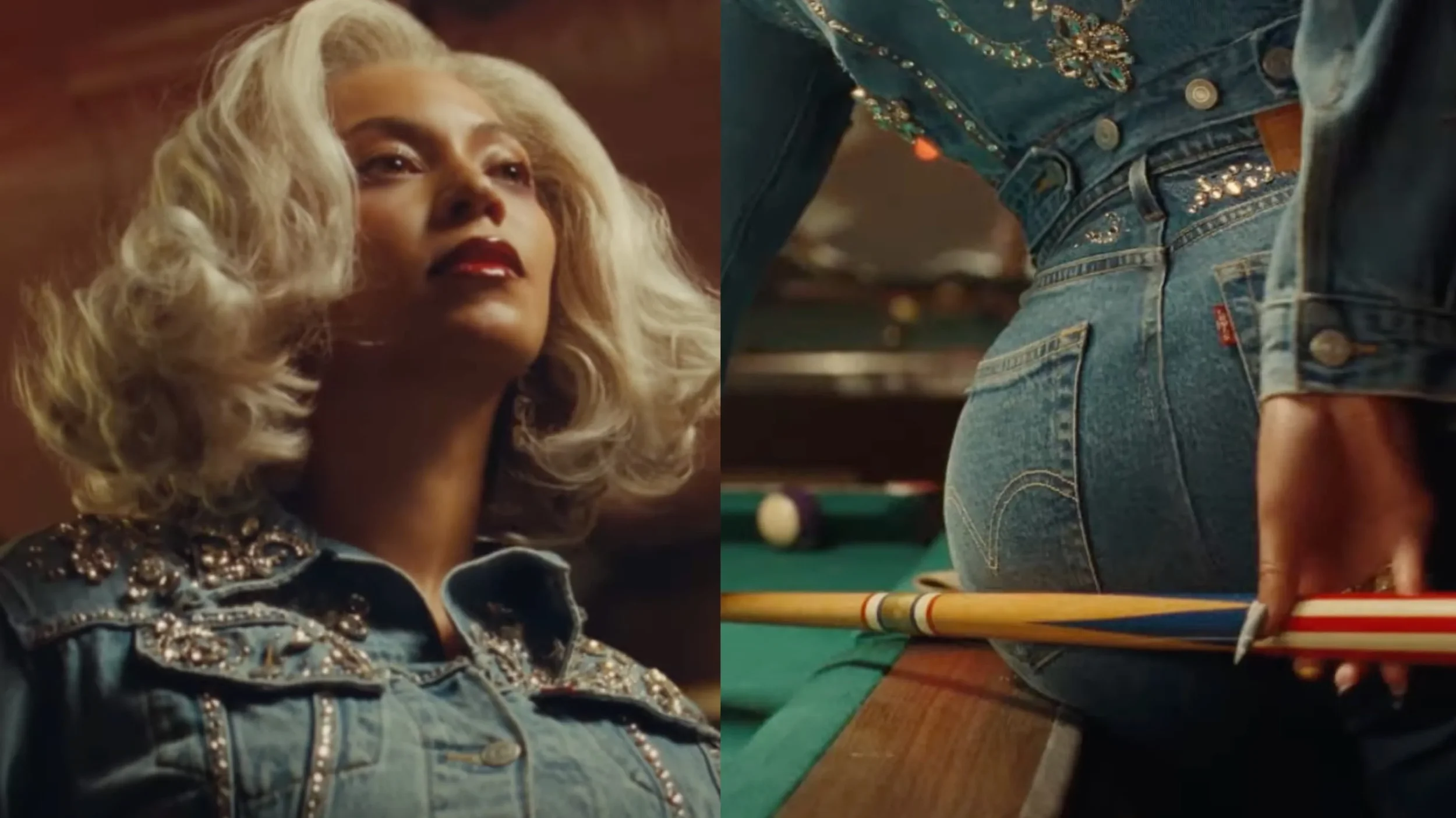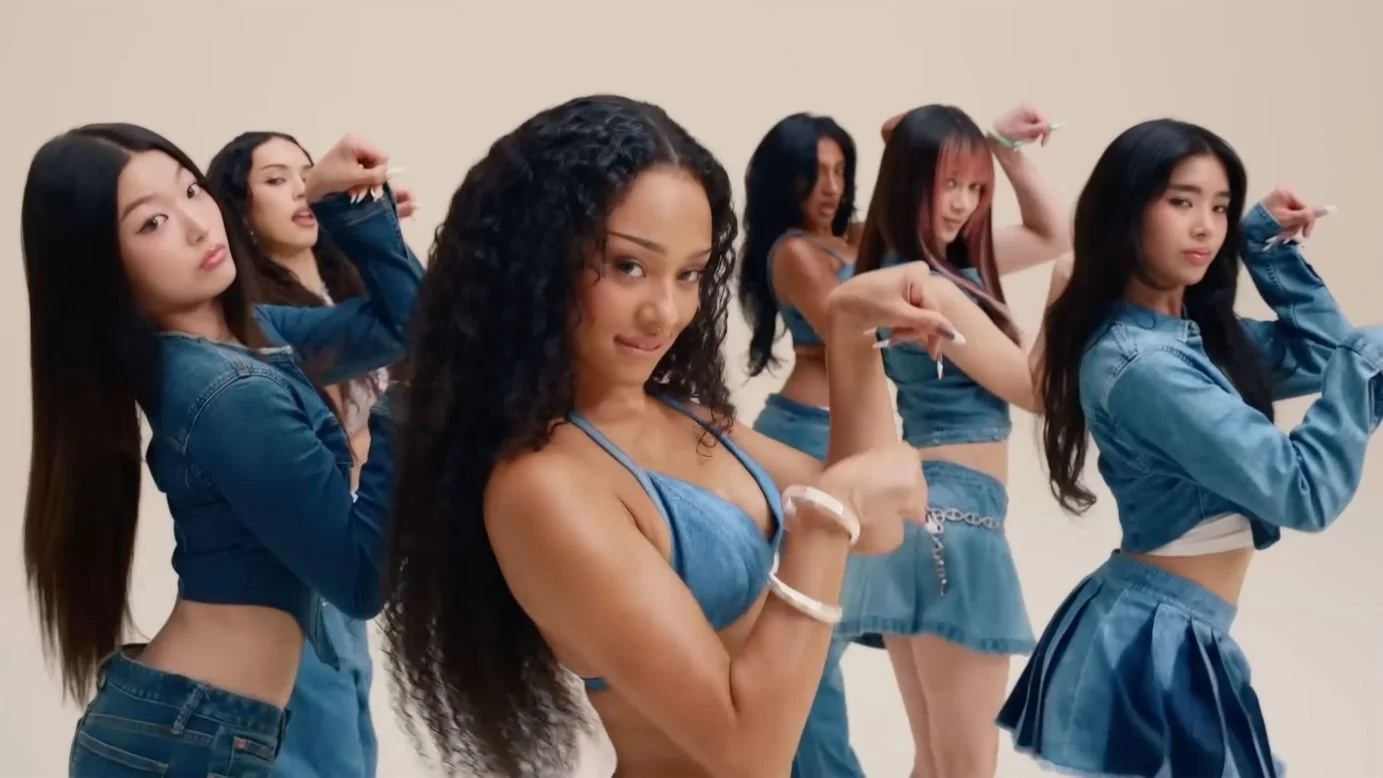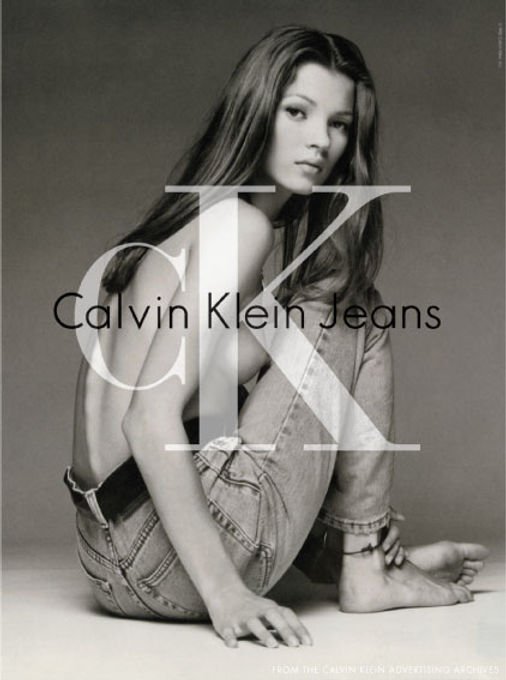The Politics of Denim: America’s Most Controversial Fabric
Jeans are Americana. They are more than fabric or fashion. They carry the weight of history, politics, rebellion, and identity, making them the most enduring garment in American life and the one we are always ready to debate.
Fast-forward to 2025, and the denim debate is alive once again. Sydney Sweeney’s American Eagle campaign — with its cheeky pun on jeans/genes — became a lightning rod for cultural conflict, sparking accusations of eugenic undertones while being embraced by conservatives as a strike against “woke” overreach. The fallout proved what history has long shown: jeans are never neutral. They are a canvas on which America projects its deepest anxieties and fiercest ideals.
The Campaign and the Backlash
Launched on July 23, 2025, the American Eagle spot showed Sweeney correcting a banner that read “Sydney Sweeney has great genes” to “jeans,” and quipping, “My jeans are blue.” Critics accused the campaign — especially its focus on her blonde hair and blue eyes — of reinforcing Western beauty ideals and echoing eugenic language.
American Eagle responded swiftly: “The campaign is and always was about the jeans… celebrating how everyone wears their AE jeans with confidence.” Despite the defence, the damage was done. The campaign delivered over $200 million in estimated market value gains and unprecedented impressions — but also drove store foot traffic down for two straight weeks.
What began as limited criticism on social media was magnified almost overnight by conservative media and political figures. Former President Trump called it the “HOTTEST ad out there.” For right-wing commentators, it became a victory against cancel culture. Progressives, meanwhile, doubled down in outrage, framing the campaign as careless and dangerous. Fashion veteran Mickey Drexler later weighed in, arguing AE should have cut its losses with a simple apology: “I screwed up.”
Sweeney herself has remained silent. Yet her peers, like Halsey, defended their film Americana from boycott calls tied to the ad, insisting that art must transcend manufactured media temptations.
Jeans Are Americana
No garment captures the American imagination quite like a pair of blue jeans. Denim is stitched into the nation’s history — born in the California gold rush, worn by miners, cowboys, and ranch hands, and hardened in the soil of labour. By the 20th century, Levi’s weren’t just pants; they had become a shorthand for grit, endurance, and the mythology of the frontier. Jeans are Americana.
For conservatives — especially traditionalists and populists — denim still carries that weight. It represents “real work ”and “real Americans.” A pair of Wranglers or Levi’s is less about fashion than function, linking the wearer to labour, land, and continuity. Rodeos, county fairs, construction sites, and family farms form the cultural backdrop where jeans remain most at home.
This symbolism stands in deliberate contrast to coastal fashion elites. Where designer denim may signal exclusivity, conservative culture leans on jeans as a cultural equaliser. Anyone can afford them, anyone can wear them. That accessibility makes them both humble and powerful. Politicians have long understood this visual code: campaign-trail denim, paired with boots or a work shirt, communicates humility and relatability far more effectively than any tailored suit.
The Symbolism of Jeans
For decades, politicians have leaned on denim to collapse the distance between office and electorate, signalling solidarity with “real America.”
From Ronald Reagan’s ranch photographs to George W. Bush clearing brush in Texas, jeans paired with cowboy boots and a button-down shirt became the unofficial campaign uniform. The message: I work, I sweat, I belong to the same world you do. Even Donald Trump Jr. has embraced this aesthetic, reframing denim as proof of populist identity.
Even as Levi’s has leaned progressive in its corporate messaging, its jeans — alongside Wrangler — remain woven into Republican cultural strongholds: country music concerts, NASCAR tracks, rodeo arenas. Denim here is not about trend, but tradition. It becomes an American flag stitched into fabric, a uniform that visually aligns the wearer with patriotism and conservative values.
If conservatives see jeans as authenticity and tradition, progressives have long treated denim as a canvas for reinvention and critique.
From James Dean’s rebellious iconography to the counterculture of the 1960s, denim has been the attire of protest, individuality, and anti-establishment energy. In the 1980s and ’90s, Calvin Klein and icons like Kate Moss pushed jeans into provocative, avant-garde spaces — jeans as scandal, jeans as art. Progressives embrace denim’s mutability, with every generation reshaping it into a cultural argument about body politics, identity, and self-expression.
This divide explains why denim keeps sparking conflict. For the right, jeans are continuity — an anchor of Americana. For the left, jeans are a disruption — an aesthetic playground for challenging norms. Both sides claim jeans, which means every ad, every collab, every celebrity endorsement becomes a proxy battle over who gets to define culture.
Timing and Politics
When American Eagle unveiled Sydney Sweeney as the face of its summer 2025 campaign, the concept must have seemed simple: playful wordplay that leaned into the actress’s rising cultural profile and her crossover appeal to both mainstream and Gen Z audiences. The tagline, “Sydney Sweeney has great jeans,” was cheeky, a pun designed to spark chatter. Yet in its execution, the ad leaned on imagery — blonde hair, blue eyes, a focus on heredity — that made the pun less innocent. By July 23, the day of its release, critics were already pointing out the uncomfortable overlap with eugenic rhetoric.
In another year, this might have remained a minor PR headache. But 2025 is not another year. The ad arrived in the thick of Donald Trump’s second presidency, at a time when cultural products are instantly politicised. Clothing, casting choices, and even marketing copy are all read as statements of political allegiance. Denim, long associated with workwear and authenticity, had already been weaponised as a populist symbol. To launch a campaign that played on genes and jeans in this climate was to toss a match onto dry brush.
The Right’s Embrace
The escalation was almost immediate. Within days, Trump himself declared it the “HOTTEST ad out there,” signalling to his base that this was not just a brand campaign but a cultural battle. Conservative commentators ran with the narrative, reframing the controversy as proof that the left was oversensitive and desperate to cancel anything wholesome. What might have remained an awkward marketing misstep became, under the weight of partisan attention, a rallying point. In conservative spaces, the campaign was celebrated as defiance — a denim-clad rejection of liberal policing.
The Left’s Backlash
For progressives, the problem was clear. The imagery tapped into Western beauty standards at precisely the moment when the fashion industry was working to distance itself from them. What looked like a wink to some looked like dangerous nostalgia to others. Social media activists highlighted the historical baggage of connecting appearance, heredity, and value. Boycotts were floated. Commentators demanded accountability. American Eagle, caught off guard by the storm, issued a defence that the ad was “always about the jeans.” That insistence on innocence only inflamed critics further, who saw it as tone-deaf.
The Business Fallout
The numbers told their own story. On the one hand, the campaign drove massive attention — more than $200 million in estimated market value and record-breaking impressions. On the other hand, American Eagle stores saw foot traffic decline in the weeks following the controversy, suggesting that exposure and sales were moving in opposite directions. Former Gap CEO Mickey Drexler critiqued the brand’s handling, arguing that a simple admission — “I screwed up” — might have defused the backlash before it spiralled. Instead, the refusal to engage seriously made the campaign feel like it was doubling down, prolonging the outrage cycle.
The Silence of the Star
Sydney Sweeney herself chose not to comment. That silence was notable. In an era when celebrities often race to explain or clarify their involvement, Sweeney’s restraint was read in different ways: as savvy distance by some, as tacit approval by others. Her co-star Halsey, however, felt compelled to step in, defending their shared film, Americana, from boycott calls that spilt over from the ad controversy. In the public imagination, Sweeney’s denim campaign had blurred into her broader body of work, a reminder that in the age of social media, advertising no longer stays in its lane.
The Perfect Storm
The firestorm intensified when reporting surfaced that Sweeney is a registered Republican. That revelation reframed the ad entirely. What could once be defended as accidental resonance with conservative imagery now looked to many like an intentional alignment. For critics, her party registration confirmed suspicions that the campaign was a dog whistle; for supporters, it validated her as “one of us,” a young Hollywood star unafraid to stand apart from the industry’s liberal consensus.
The controversy’s persistence owed less to the pun itself than to its timing. Under Trump’s presidency, jeans were already charged symbols. To conservatives, they represented real work and real America; to progressives, they were sites of ongoing battles over inclusivity and identity. Sweeney’s campaign tapped that raw nerve, intentionally or not. The ad was released into a moment where denim was not fashion but metaphor, where a blue-eyed actress in blue jeans could become a political statement overnight.
In the end, the AE campaign revealed less about Sydney Sweeney or American Eagle than it did about the state of America itself. The outrage, the embrace, the boycotts, the defences — all of it testified to the fact that denim remains combustible. The jeans/genes pun may have been intended as wordplay, but in 2025, nothing about jeans is ever just a joke.







